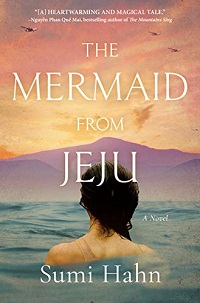Goh Junja is a young diver of Jeju who, like her mother and grandmother, plunges to the sea floor to collect delicacies to feed her village. Lisa See (The Island of Sea Women) and Mary Lynn Bracht (White Chrysanthemum) have also written novels about these female divers, called haenyeo, and anyone who enjoyed either should read this one, too. They share a wartime setting but differ in style and theme.
The Mermaid from Jeju opens, unusually, with the death of the main character, a doctor’s wife in 2001 Philadelphia, then jumps back to 1944. Eighteen-year-old Junja, having come into her power as a haenyeo after surviving a near-drowning, convinces her mother to let her make the annual trek to Hallasan, a distant mountain, in her place to trade abalone for a piglet. While there, Junja grows intrigued by Suwol, the noble eldest son of the house, and he with her. She returns to Jeju to face her mother’s tragic death, reportedly after a fatal dive. Meanwhile, in the postwar era, the political situation throughout Korea has grown treacherous: the Japanese occupiers have fled, the Americans are landing, and Nationalist forces are tracking down potential communist sympathizers.
The story immerses readers wholly in the culture and history of Jeju, from a terrible real-life tragedy to local myths and elements of Korean spirituality. On the one hand, it’s never didactic; on the other, some aspects don’t become clear to Junja until later, which creates a certain vagueness. When Junja’s widower visits Korea to lay his ghosts to rest, it crystallizes the plot and brings events full circle in a satisfying and meaningful way.
The Mermaid from Jeju was published by Alcove Press in 2020; I reviewed it from a purchased copy for May's Historical Novels Review.
When my husband saw the title of this book, he asked about the setting and then mentioned he'd been to the island, which he called Cheju-do (Cheju island), when he was stationed in Korea with the US Army in 1979-80. Below is one picture he took there, to provide a sense of the geographic landscape. Jeju, a volcanic island, is a UNESCO World Heritage site.
 |
| 300-foot cliff on Jeju island, off the southern coast of Korea |





No comments:
Post a Comment